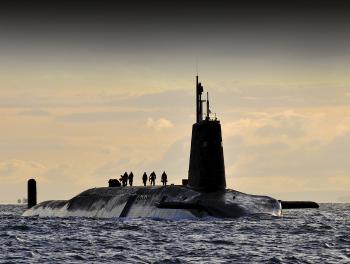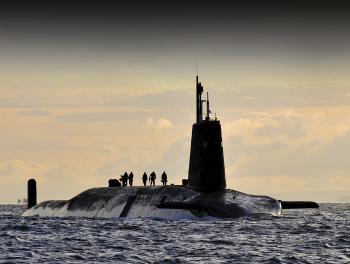Faslane, Scotland. PHOTO: CPOA (PHOT) TAM MCDONALD
@UK MOD / CROWN COPYRIGHT

Britain may not be able to maintain its nuclear missile submarine capability because of shortages of navy and civilian personnel.
That was the stark message of the ministry of defence’s official risk register, obtained by the Nuclear Information Service (NIS) through the Freedom of Information Act. On 9 August, NIS placed on its website both the declassified, redacted, MoD risk register, and its own unofficial and uncensored risk assessment of Britain’s military nuclear programme.
The defence nuclear executive board (DNEB) risk register said: ‘There is a risk that the RN [royal navy] will not have sufficient suitably qualified and experienced personnel (SQEP) to be able to support the manning requirement of the submarine fleet’.
The key shortage is of nuclear engineers, partly because of the ‘national and global nuclear engineering skills shortage’.
The DNEB said that the MoD’s ‘inability to recruit, retain and develop sufficient nuclear and submarine design qualified personnel will result in an inability to support Defence Nuclear Programme’.
In other words, the navy could conceivably be prevented from deploying Trident nuclear missile submarines (or a successor system) because of a lack of trained people to actually staff the vessels.
It has been reported that some of Britain’s submarines have been going out on tour with only 85% of their intended personnel.
Can’t get the staff
Adml Lord West, the former First Sea Lord, told the Telegraph the situation was ‘very worrying’: ‘There’s no doubt that recruiting and keeping highly qualified nuclear engineers has been tough. Nuclear engineers have also become highly sought-after by the civil industry as this country has not trained enough.’
A separate arm of the MoD, the defence nuclear safety regulator (DNSR), recently reported that: ‘The problem for all employers remains the dearth of experienced mid-career people because the nuclear programmes were at a low ebb when this age group started their careers’. The DNSR noted that there is expected to be a shortfall in experienced marine engineering and weapons engineering officers for British submarines ‘into the next decade’.
The armed forces pay review body noted in 2011 that much of the training for these ‘post-charge’ officers (experienced operators who have managed nuclear power units) has to take place at sea, and is therefore limited by the number of submarines available. There is no scope to bring qualified people in from the outside, because of the unique nature of the skills.
The government has signalled its intention to replace Trident with a similar system. Apart from possible personnel shortages, the DNEB risk register also expressed concern at the weakness of the ‘UK industrial base’ due to the ‘erosion of manufacturing capability, cost growth, time delay’ and other factors.
Red alert
In 2011, the MoD was forced to release reports by another internal regulator, the defence nuclear environment and safety board (DNESB), which judged in 2009 that some areas of military nuclear operations were ‘barely resourced to deliver their outputs (including safety)’, and ‘the resilience of the submarine enterprise [was] under threat and even the ability to recognise this at risk’.
The DNESB stated that the lack of funding and lack of competent staff were the ‘two principal threats to safety in the defence nuclear programmes in the medium term’.
The DNESB raised the alert level on staff shortages to red in 2008, and the alert level on the lack of resources was raised to red in 2009, the Guardian noted in January 2011.
/p


